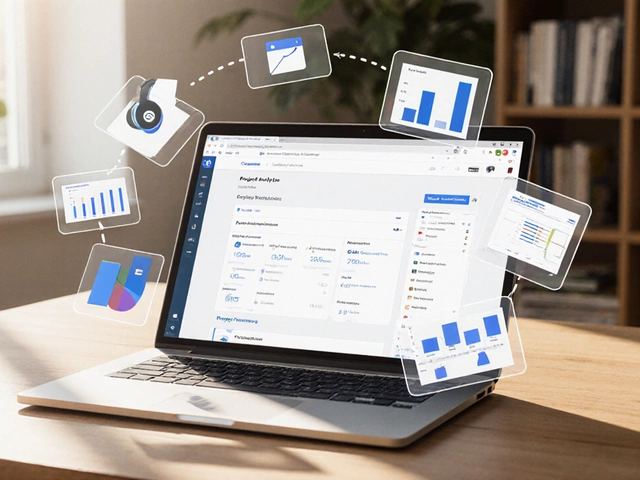
Skill Development Course Advisor
Find Your Perfect Skill Development Course
Answer a few quick questions to get personalized recommendations on the best course type and platform for your career goals, time availability, and budget.
When you ask yourself best skill development course, you’re really looking for a learning path that boosts your career, fits your schedule, and gives real‑world value. Below you’ll find a step‑by‑step guide to picking the right course, a side‑by‑side comparison of the most popular platforms, and a checklist you can use right now.
What Makes a Skill Development Course "the best"?
Skill Development Course is a structured learning program that focuses on building practical abilities, from technical know‑how to soft‑skill expertise. It typically includes video lessons, hands‑on projects, and a certification or badge that signals competence to employers. The "best" one meets three core needs:
- Relevance: The content aligns with current industry demands.
- Quality: Instructors are credible, materials are up‑to‑date, and assessments reflect real‑world tasks.
- Outcome: Learners can demonstrate new skills via projects, a certification, or a measurable boost in job performance.
With those pillars in mind, let’s talk about the criteria you should evaluate before hitting "Enroll".
Key Criteria for Evaluating Courses
- Industry Alignment: Check whether the curriculum matches job postings in your target field. For instance, data‑analytics roles now demand knowledge of Python, SQL, and Tableau.
- Instructor Credibility: Look for instructors who have worked at leading companies or hold recognized certifications. A professor from the University of Cambridge, for example, adds academic weight.
- Learning Format: Do you prefer bite‑size videos, live workshops, or project‑centric labs? Some platforms let you switch between formats.
- Assessment Rigor: Peer‑reviewed projects, timed quizzes, and real‑world case studies are better indicators of mastery than multiple‑choice tests alone.
- Certification Value: A badge from a reputable platform (e.g., Google Career Certificate) often appears on LinkedIn and can be filtered by recruiters.
- Cost vs. ROI: Calculate the total price, possible financial aid, and the expected salary bump after completion.
- Community & Support: Active forums, mentor access, and career services can make the difference between finishing and dropping out.
Top Online Learning Platforms in 2025
Below is a snapshot of the most widely‑used platforms that host skill development courses. Each has its own strengths, pricing models, and flagship subjects.
| Platform | Pricing (per month) | Key Subjects | Certification Type | Free Trial |
|---|---|---|---|---|
| Coursera - partner of top universities | $39-$99 | Data Science, Business, Computer Science, Health | University‑issued certificates, professional certificates | 7‑day |
| Udemy - marketplace for independent instructors | Pay‑per‑course (average $20-$200) | Web Development, Design, Personal Development | Udemy‑issued completion badge | 30‑day money‑back |
| LinkedIn Learning - professional‑focused library | $29.99 | Project Management, Marketing, Soft Skills | LinkedIn badge displayed on profile | 1‑month |
| edX - Harvard‑MIT partnership | Free audit; $50-$300 for certificates | Engineering, Data Analytics, Business | Verified certificates from universities | Free audit |
| Skillshare - creative‑oriented community | $19 (annual) | Illustration, Photography, Entrepreneurship | Skillshare badge (non‑accredited) | 2‑week |
| Google Career Certificates | $39 (monthly) | IT Support, Project Management, Data Analytics | Google‑endorsed professional certificate | 7‑day |
| Microsoft Learn | Free | Azure, Power Platform, Dynamics 365 | Microsoft badge (industry‑recognized) | Always free |
Choosing the Right Course Type
Not every skill development course is built the same. Here’s a quick guide to five popular categories and when each shines.
- Coding Bootcamps: Intensive, 12‑week programs that aim to make you job‑ready in software development. Ideal if you’re switching careers and need a fast, immersive experience.
- Data‑Analytics Certificates: Focus on tools like Python, SQL, Power BI, and real‑world case studies. Great for marketers, finance analysts, and product managers who want data‑driven decision skills.
- Project‑Management Professional (PMP) Prep: Structured around the PMBOK guide, includes mock exams and stakeholder communication drills. Perfect for aspiring managers.
- Digital‑Marketing Mastery: Covers SEO, PPC, content strategy, and analytics platforms such as Google Ads and HubSpot. Best for freelancers or small‑business owners.
- Soft‑Skill Workshops: Public speaking, negotiation, and emotional intelligence. These are often short, interactive modules and can dramatically improve leadership presence.
Real‑World Success Stories
Seeing how other learners turned a course into a promotion helps you visualise the payoff. Below are three concise case studies.
- Maria, Dublin - Data Analytics: After completing Google’s Data Analytics Certificate on Coursera, she added a Tableau project to her portfolio. Within three months, she secured a senior analyst role earning €15,000 more per year.
- Liam, London - Full‑Stack Development: He enrolled in a 16‑week bootcamp via Udacity (partnered with Google). The hands‑on capstone built a SaaS product that attracted a freelance client paying €3,000 per month.
- Aisha, New York - Digital Marketing: Using LinkedIn Learning’s SEO specialization, she revamped her company’s blog, boosting organic traffic by 68% and earning a promotion to Marketing Manager.
Quick Checklist: Is This Course Right for You?
- Does the syllabus list the exact tools you need (e.g., Python 3.12, Power BI Desktop, Agile Scrum)?
- Is the instructor’s background verifiable (LinkedIn profile, published work)?
- Are there real‑world projects that you can showcase on GitHub or a personal website?
- Does the platform provide a clear path to a recognized certificate?
- Is there a community forum or mentor access for troubleshooting?
- Can you realistically finish the course within your time constraints?
- Does the cost fit your budget, considering possible employer tuition reimbursement?
Answer “yes” to at least five of these items, and you’re likely on the right track.
Common Pitfalls to Avoid
Even the most motivated learners can hit roadblocks. Here are five mistakes that derail progress and how to sidestep them.
- Choosing a course for hype, not need: A trendy AI class won’t help a sales professional unless they need AI‑driven forecasting.
- Skipping the hands‑on portion: Theory without practice leaves you unprepared for interview tasks.
- Ignoring credential value: A badge from an obscure platform may not be recognized by hiring managers.
- Under‑estimating time commitment: Treat the course like a hobby and you’ll fall behind.
- Not updating your résumé: Add the new skill and certification immediately to keep momentum.

Frequently Asked Questions
How long does a typical skill development course last?
Most online courses range from 4 weeks for short‑skill modules up to 6 months for comprehensive bootcamps. Your schedule and the depth of the subject will dictate the exact duration.
Are free courses worth the time?
Free courses are great for sampling a field, but they often lack graded projects and recognized certificates. Pair a free audit with a paid verification if you need proof for employers.
Can I get employer reimbursement for these courses?
Many companies have tuition‑assistance programs that cover accredited certificates or recognized platforms like Coursera and edX. Check your HR policy and keep the receipt and certificate ready for reimbursement claims.
Do I need a degree before taking a skill development course?
No. Most courses are designed for learners of any educational background. The focus is on demonstrable ability, not on prior academic credentials.
How can I measure the ROI of a course?
Track metrics such as salary increase, promotion speed, freelance earnings, or cost‑savings after applying the new skill. A simple formula: (New Income - Old Income) - Course Cost = Net ROI.
Next Steps
Ready to enroll? Follow this short workflow:
- Identify the skill that aligns with your career goal.
- Match the skill to a platform using the comparison table above.
- Check for any employer tuition‑assistance or scholarship options.
- Enroll, set a weekly study schedule, and start the first module.
- Complete the capstone project, add the certificate to LinkedIn, and update your résumé.
By treating the course like a job you’d negotiate-complete with milestones and a clear deliverable-you’ll stay motivated and see tangible results.
Key Takeaways
- Focus on relevance, quality, and measurable outcomes when judging a course.
- Coursera, Udemy, LinkedIn Learning, edX, Skillshare, Google Career Certificates, and Microsoft Learn cover most skill‑development needs.
- Pick the category (coding bootcamp, data analytics, project management, digital marketing, soft skills) that matches your career move.
- Use the checklist to avoid common pitfalls and assure the course fits your time, budget, and goals.
- Showcase the finished certificate on LinkedIn and update your résumé to unlock new opportunities.




